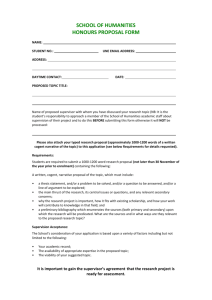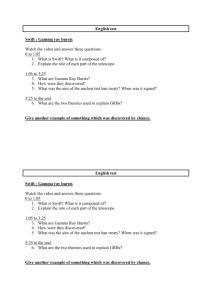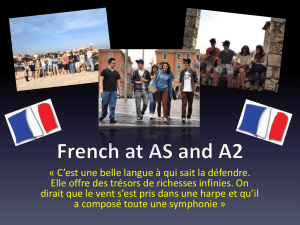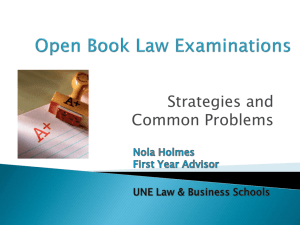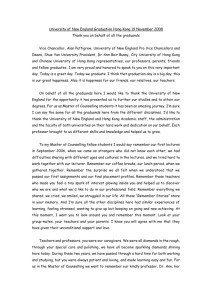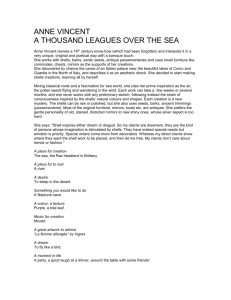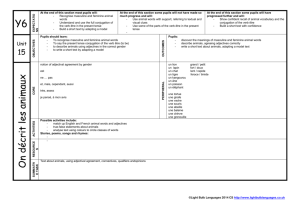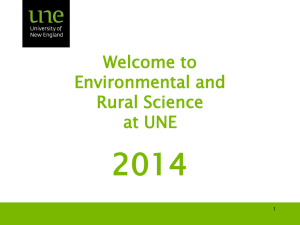University of New England Armidale Australia - i
advertisement
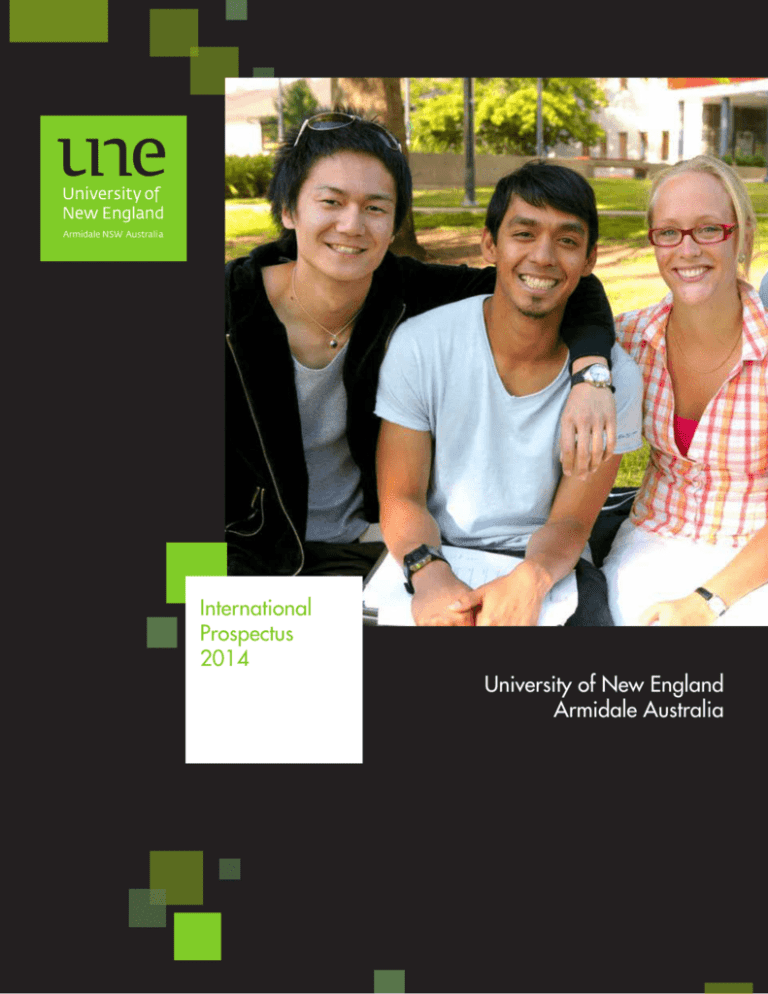
Armidale NSW Australia International Prospectus 2014 University of New England Armidale Australia I am pleased to welcome you to the University of New England (UNE), one of Australia’s oldest universities with a 70 year reputation for excellence in teaching, learning and research. WELCOME From the Vice-Chancellor I am pleased to welcome you to the University of New England (UNE), one of Australia’s oldest universities with a 70 year reputation for excellence in teaching, learning and research. UNE also boasts an outstanding on-campus experience, with its unique residential college system. Here, you will enjoy the perfect balance between high educational standards and an outstanding lifestyle. In addition, we have established formal links with many overseas institutions and maintain a close relationship with our alumni. The University is in the city of Armidale, in the heart of the picturesque New England Tableland region of the State of New South Wales. The New England region is famous for its magnificent gorges, waterfalls and rivers, history and vibrant culture, and for the contrasting beauty of four distinct seasons. Armidale is a regional Australian community that is proud of its multicultural society. The engagement of international students with the wider community is an important aspect of life at UNE, and something we know international students appreciate greatly. The University of New England has again achieved a five-star (maximum) rating for “overall graduate satisfaction” in the Good Universities Guide for 13 of the past 14 years – an achievement matched by no other Australian university. UNE is proud of its vigorous research. Staff and students are actively engaged in internationally recognised research across all academic fields. Our scholars and scientists have world-class reputations through their contributions to fields such as mathematics. rural science, agriculture, economics and law, educational administration, natural resource management, nursing and rural medicine. We have also identified a number of research priorities across all academic areas at UNE. I highly recommend the University of New England as a place to study, and I assure you that it is a friendly, nurturing environment providing both academic excellence and a truly Australian experience. I look forward to welcoming you to the University of New England. Professor Jim Barber Vice-Chancellor and CEO University of New England Quality Teaching and Learning Environment Students at UNE have access to worldclass and innovative learning experiences, whether studying on-campus or via distance education. Study programs are presented by highly committed and skilled academics who are experts in their respective fields of study. UNE programs are continually renewed to ensure that they are up to date with the latest developments. increases discussion and develops a greater understanding of the study area. This type of interaction between academic staff and students develops a strong sense of belonging and an attitude of support among peers. UNE’s Armidale campus offers a wide variety of teaching spaces ranging from fully equipped lecture theatres and tutorial Technology and computer literacy are rooms to scientific laboratories, green holistically integrated into UNE learning houses, education class rooms, computer outcomes and many courses and units have laboratories, agricultural properties and online components introducing students to a mock court room. UNE’s main campus evolving methods of teaching and learning library, Dixson Library, is open to all using contemporary technological resources. students,staff and academics and houses UNE is committed to providing a high quality over 36 kilometres of shelving holding more academic teaching and learning experience than one million hardcopy volumes across for all its students. four floors. The ground floor was recently fully re-furbished as a ‘Learning Commons’. Each student is respected as an individual at UNE which has one of the lowest staff-tostudent ratios of any university in Australia. At UNE students have the opportunity to communicate directly with academic staff and classmates which promotes learning, The Learning Commons was designed to meet student needs and offers the latest facilities for both private study and collaborative learning. At the Commons, students can consult with support personnel including learning and careers advisors, counsellors, librarians and IT specialists. Students have access to purpose-built learning spaces including a dedicated training lab, media rooms, a podcasting studio, study rooms and classrooms for problem based learning (PBL) as well as 55 computer workstations, highspeed internet and wireless connections, recording equipment, scanners, printers,copiers and microfilm/microfiche readers. The Australian Government recognises UNE’s achievement in teaching and learning and has provided significant funding through the Learning and Teaching Performance Fund. These government awards are assessed on positive employment outcomes for students,student progression and overall student satisfaction. UNE GRADUATE ATTRIBUTES, EMPLOYMENT AND LIFELONG LEARNING International UNE graduates are highly sought after by future employers because they possess the skills to work in their chosen field as well as the ability to adapt to new challenges and continue lifelong learning. In addition to the high graduate employment rate, students consistently rate their UNE experience very highly and beneficial in securing employment. UNE IS COMMITTED TO ENSURING GRADUATES POSSESS THE FOLLOWING ESSENTIAL ATTRIBUTES: Knowledge of a Discipline Communication Skills Global Perspective Information Literacy Life-Long Learning Problem Solving Social Responsibility Team Work Living in Armidale Armidale is located roughly halfway between the metropolitan capitals of Sydney and Brisbane. It is a centrally located city in the Northern Tablelands of New South Wales. Armidale’s fine buildings, tree-lined streets and numerous parklands make it a beautiful city. Many buildings have heritage significance, including civic, commercial and institutional buildings, private dwellings, and cathedrals. Students find that Armidale has most of the facilities and benefits of a metropolitan centre with the country advantages of a secure and pristine environment. With its easygoing lifestyle, Armidale is the ideal place for students to live while studying. The city boasts music venues, theatres, restaurants, cafés, hotels, entertainment and sporting facilities, and a range of shops to cater for all tastes and budgets. and dance bands regularly perform at venues across the city. Armidale has many clubs and hotels where people of all ages and nationalities congregate to socialise, listen to music, dance the night away or kick back and relax – which is especially good outdoors on a warm summer night! Climatically, Armidale is one of the relatively few areas in Australia that enjoys four distinct seasons, with spectacular autumns, frosty winters, glorious summers and rejuvenating springtimes. Armidale’s population of 26,000 makes it easier to join clubs and organisations, to get to know people and become part of the community and there is always something happening. The city’s sporting facilities include a golf course, tennis clubs, outdoor and indoor (heated) swimming pools, gymnasiums, and sailing, bushwalking, orienteering and canoeing/ Known as the cultural and educational centre of kayaking clubs. There are also many local sporting the north, Armidale is proud of The New England teams to participate in (or watch from the sideline) Regional Art Museum (NERAM), which houses including football, soccer, cricket, hockey, rugby, two major art collections of over 1,200 works, golf, swimming and athletics. Armidale’s greatest including paintings by famous Australian artists Tom natural asset is its proximity to some of the State’s Roberts and Arthur Streeton. Theatre also plays most magnificent National Parks, including Warrabah Cathedral Rock, Guy Fawkes River, an active part in Armidale life and local theatre Oxley Wild Rivers and New England. Many companies also offer plays on a regular basis. students find a weekend getaway to one of these The Armidale Orchestra, Jazz Band, Armidale nearby national parks an ideal escape from the City Band and the Youth Orchestra hold regular pressures of study. concerts and a variety of local and imported rock Study Online In addition to on-campus degrees, UNE offers an extensive range of degrees which can studied from anywhere in the world via distance education. Study online is a flexible and increasingly popular mode of study for busy students with family and work commitments to attain their education goals without attending regular classes on campus. UNE has been teaching students by distance since 1955 and has earned a worldwide reputation for commitment to high quality distance education and academic learning. UNE has over 15,000 distance education students and is Australia’s longest continuous distance education provider. Students studying via online or part-time are not eligible to study in Australia on a student visa. For undergraduate and postgraduate coursework students, the recommended time commitment is 15 hours per week for each unit being studied – a full-time load is four units of study per trimester, but off-campus students can choose to study parttime (one - two units per trimester) provided they complete the degree within the required time frame. While online education students need to be self motivated in their study, they have access to online unit content, CD-ROMs, DVD, text books and other reference materials. UNE provides web-based facilities which allow students to send questions, submit assignments, order library books, check grades and access other resources, 24 hours a day, seven days a week. For further information about study online visit: www.une.edu.au/study/why-study-at-une/ study-online More information about courses offered via study online can be found in the online course and unit catalogue at: www.une.edu.au/courses/ The UNE Business School offers postgraduate coursework courses in Business, Accounting, Finance, Commerce, Management, Organisational Training and Development through the Graduate School of Business (GSB). For more information on GSB courses, please visit: www.une.edu.au/gsb/ RESEARCH BY ONLINE STUDY International students can also undertake research degrees (eg PhD or Masters) via online study. Although students may be required to attend the campus in Armidale for either mandatory intensive schools or face-to face consultation with supervisors; the internet, phone, email and other web technologies form the basis for contact between students and the University for a majority of their course. Academics at UNE are experienced at supervising international students via online and are flexible in their approaches to the needs of students studying and researching off-campus. Only international students who are studying by online study from overseas or are studying in Australia on avisa other than a student visa are permitted to enrol at UNE by study online. RESEARCH AT UNE In addition to its distinguished teaching, UNE is an internationally recognised research centre. UNE currently has more than 700 PhD candidates pursuing fundamental and applied research in areas including agriculture, economics, education, nursing, environmental management, health, and rural medicine. Scholarships at UNE UNE offers a number of substantial scholarship opportunities to postgraduate students studying research-based degrees at UNE. There are different types of scholarships available; some are targeted to specific disciplines or research projects and others are more general with broader eligibility criteria. The latest information on different types of scholarships is outlined on the university’s website at: www.une.edu.au/researchservices/pgstudy/scholarships/ Targeted Research Areas Targeted Research Areas UNE has identified the following research areas for Masters by Research and Doctor of Philosophy (PhD) degrees. ENVIRONMENTAL AND AGRICULTURAL CHANGE CLIMATE CHANGE ADAPTATION AND MITIGATION • • • • • • • • • • • • • • • Marine and Freshwater Biodiversity Terrestrial Biodiversity Natural Resource Management Rural Futures Australian Fauna Vegetation Research Sustainable Agriculture Agricultural Genetics Animal Research Rural Health Rural Medicine Health Services Management Bioactive Materials Health and Clinical Psychology Gender, Health and Sexuality • • • • • • • • • • • • • • • • • • • • • • Rural and Regional Education School Science and Mathematics Education School English and Literacy Education Special Education and Diversity in Schools Economics and Public Policy Agricultural Economics Applied Economics and Policy Local Government Business and Management Higher Education Management and Policy Law Law and Institutional Arrangements for Rural Communities Natural Resources Law and Policy Asia Pacific Region Livelihoods and Development Governance, Conflict and Security Peace Studies Globalisation, Migration and Mobility Cultural Transformation Education, Health and Knowledge Transfer Environment and Climate Change Migration Research by Distance Education Targeted Research Areas UNE has identified the following research areas for Masters by Research and Doctor of Philosophy (PhD) degrees. • • • • • ENVIRONMENTAL AND AGRICULTURAL CHANGE • • • • • • • Climate Change Adaptation and Mitigation • Marine and Freshwater Biodiversity • Terrestrial Biodiversity • Natural Resource Management • Rural Futures • Australian Fauna • Vegetation Research • Sustainable Agriculture • Agricultural Genetics • Animal Research • Rural Health • Rural Medicine • Health Services Management • Bioactive Materials • Health and Clinical Psychology • • • • • • • • • • • • Gender, Health and Sexuality Rural and Regional Education School Science and Mathematics Education School English and Literacy Education Special Education and Diversity in Schools Economics and Public Policy Agricultural Economics Applied Economics and Policy Local Government Business and Management Higher Education Management and Policy Law Law and Institutional Arrangements for Rural Communities Natural Resources Law and Policy Asia Pacific Region Livelihoods and Development Governance, Conflict and Security Peace Studies Globalisation, Migration and Mobility Cultural Transformation Education, Health and Knowledge Transfer Environment and Climate Change Migration ACCOMMODATION The University of New England offers 7 dormitory styles college residences on campus. The colleges provide single room accommodation with regular cleaning and linen services and shared bathroom and laundry facilities and communal dining. On-Campus The University of New England offers 7 dormitory style college residences on campus. The colleges provide single room accommodation with regular cleaning and linen services and shared bathroom and laundry facilities and communal dining. Most colleges have a flexichoice card system in place for meals allowing students to dine at college or on campus. College staff or resident fellows are always available to assist students. Resident Fellows are senior students who live in college and mentor and support other students during their stay in college. The weekly fee for college accommodation ranges from $260 to $350 depending on college and meal options. Additional information on the colleges can be found at their websites: Austin College: www.une.edu.au/campus-life/uneaccommodation/colleges/austin Drummond & Smith College: www.une.edu.au/campus-life/uneaccommodation/colleges/drummondand-smith Duval College: www.une.edu.au/campus-life/uneaccommodation/colleges/duval Earle Page College: www.une.edu.au/campus-life/uneaccommodation/colleges/earle-page Mary White College: www.une.edu.au/campus-life/uneaccommodation/colleges/mary-white Robb College: www.une.edu.au/campus-life/uneaccommodation/colleges/robb Wright Village www.une.edu.au/campus-life/uneaccommodation/colleges/wrightvillage St. Albert’s College: www.une.edu.au/campus-life/uneaccommodation/colleges/st.-alberts Off-Campus There are many houses and units available for rent in and around the town of Armidale, though students need to be aware that during the four - six weeks before trimester commencement there is a much higher demand for housing and they need take into account the extra time it may take to find suitable accommodation. When deciding to rent a house or unit, students need to take into consideration whether they will live on their own or with other people, and the cost of setting up a house, which will include a bond (equal to four weeks rent), furniture, electricity connection, phone connection and other setup costs. Properties for rent can be located through Armidale real estate agents listed here: www.realestate.com.au/rent/inarmidale,+nsw+2350/list-1 More information about accommodation options can be found online at: www.une.edu.au/study/ international/accommodation-andliving-costs Campus Life and Facilities UNE is proud that students from more than 80 nations study on campus, creating a multicultural atmosphere. The campus is well equipped with first rate sporting facilities, shops, restaurants, medical facilities, childcare, a post office and banking facilities. In addition to excellent study facilities, UNE provides an environment that facilitates the creation of lifelong friendships. Also, living costs in Armidale are comparatively lower than in metropolitan cities, and students can immerse themselves in the ‘real’ Australian academic experience. CAMPUS ESSENTIALS A retail shop, newsagent and post-office rolled into one, Campus Essentials has everything needed for life at UNE. SLEEK HAIR STUDIO UNE’s very own hair salon - with great deals for students on haircuts,massages and beauty treatments and products. CAMPUS BOOKSHOP There are two bookshops on campus; a retail shop which stocks all current student textbooks and a secondhand shop where students can buy used textbooks at reduced prices. FACILITIES ON CAMPUS GRIND & SQUEEZE Located in the centre of the campus, Grind & Squeeze is a great place for lunch, snacks or an espresso coffee during the day. THE BOOLOOMINBAH COLLECTION The Brasserie and Courtyard Café are located in the historic Booloominbah homestead. Relax with coffee and cake or enjoy excellent food throughout the year at Booloominbah. MEDICAL CENTRE The UNE Medical Centre is available specifically for students on campus. International students are able to access this facility and use their Overseas Student Health Cover (OSHC) for a number of different health services. CHILDCARE UNE offers childcare to staff and students at a university managed centre called Yarm Gwanga (meaning ‘place for children’) including long day care, residential and vacation care. www.une.edu.au/yarmgwanga ENGLISH LANGUAGE CENTRE The English Language Centre (ELC) at UNE provides a range of English language courses to students as well as a direct pathway to tertiary study at UNE through its English for Academic Purposes (EAP) program. Advantages of Studying English at the ELC • NEAS accredited Australian English language centre • Pathways to degree programs • Friendly, experienced and well • qualified staff • Diverse range of nationalities • High success rates • Fully-accredited IELTS Testing Centre • Excursions and cultural events • Natural and beautiful surroundings – a kangaroo and deer parkis right across the road from the ELC and koalas are regularly sighted in the grounds • The ELC is a friendly, nurturing environment providing both academic excellence and a truly Australian experience to all international students Teaching and Learning • Placement Tests for each student on arrival, to ensure the tailoring of programs to student needs • Guest lectures • Access teaching resources and facilities • Access to specialised academic resources • Quality assurance processes that ensure that courses are delivered to the highest standard ADMISSION This section offers prospective students a brief overview of UNE’s admission policies and procedures. Detailed information is listed on the University of New England international website English Language Requirements All students admitted to UNE must meet the University’s English language requirements for admission irrespective of the study location or study mode. UNE’s English language requirements can be viewed online at: www.une.edu.au/policies/academic-policies English Language Entry Requirements Undergraduate Postgraduate (Coursework) IELTS (Academic) 6.0 (no sub-band less than 5.5) 6.0 (no sub-band less than 5.5) TOEFL (Paper Based Test) 550+ (5+ TWE) 550+ (5+ TWE) TOEFL (Computer Based Test) 213+ (5+ TWE) 79+ (22+ written) 213+ (5+ TWE) English is student’s first language Pass grade or better in an English language subject at Australian Yr 12 level (or overseas equivalent) Satisfactory completion within the last five years of one year of full-time study at secondary, post-secondary or tertiary level, where English was the sole medium of instruction and assessment TOEFL (Internet Based Test) 79+ (22+ written) Completion of English for Academic Purposes (EAP) at UNE ELC + minimum IELTS score required for entry to EAP 70% EAP 3 + (IELTS 5.5, no sub-band less than 5.0) 70% EAP 3 + (IELTS 5.5, no sub-band less than 5.0) Pearson Test of English Academic (PTEA) Overall 57 with nothing less than 50 Overall 57 with nothing less than 50 Please note this table is a guide only. Some courses may have different requirements. Applicants should check with UNE International regarding specific English language requirements for their intended course. Teacher Education Awards Law Awards Nursing Awards Research Degrees (Masters and PhD Programs) - - - - - - 7.5 (minimum score of 8.0 in listening and speaking; 7.0 in reading and writing) 7.0 (minimum socre of 7.0 in writing and no subband less that 6.5) 6.5 (no sub-band less than 6.0) 6.5 (no sub-band less than 6.0) - - 575+ (5.5+ TWE) 575+ (5.5+ TWE) 213+ (26+ in writing, 24+ in listening and reading 91+ (22+ written, 20+ in all other sections) 213+ (26+ in writing, 24+ in listening and reading) - - - - - - - - 91+ (22+ written, 20+ in all other sections) 70% EAP 4 + (IELTS 70% EAP 4 + (IELTS 6.0, 6.0, no sub-band no sub-band less than less than 5.5) for 5.5) Nursing Awards only - Overall 64 with nothing less than 58 Undergraduate Academic Admission For direct admission into undergraduate courses offered by the University of New England, international applicants must have completed an educational qualification considered to be at least equivalent to completion of Year 12 in Australia. As a general guide, the following international secondary school qualifications are accepted for admission. Applications for admission from countries not listed below will be assessed on an individual basis. Country Qualification(s) Recommended Minimum Entry Requirements Australia All Australian Year 12 qualifications Minimum scores for entry into each UNE course are available directly from International Marketing and Pathways Foundation Studies programs conducted by Australian universities or their affiliates. Minimum of 60% in all units including English Bangladesh Higher School Certificate (HSC) First Division Pass (60%) or a minimum overall grade point average of 3.0 Brunei Darussalam Brunei-Cambridge GCE ‘A’ Levels Equivalent of 4 points in a minimum of 2 relevant ‘A’ Level academic subjects* Canada Ontario Secondary School Diploma (OSSD) Successful completion of 6 OACs with an average of 60% Average grade pass of 60% Provincial High School Diploma China Senior Middle School Certificate of Graduation Successful completion with an average score of 70% or above AND a 5 week Introductory Academic Program (IAP) for students who have met the IELTS requirement is recommended Country Qualification(s) Recommended Minimum Entry Requirements Ethiopia Ethiopian School Leaving Certificate (ESLCE) Successful completion with a minimum of 60% Fiji Fiji Form 7 Examination OR University of the South Pacific Foundation Year Average of 60% in the best four subjects (one of which must include English) Pass grade Germany Senior High School (Abitur) OR Reifezeugnis OR equivalent Completion with a pass grade Ghana West African GCE ‘A’ Levels Equivalent of 4 points in a minimum of 2 relevant ‘A’ Level academic subjects* Hong Kong (SAR) Hong Kong Advanced Level Examination (HKALE) Equivalent of 4 points in a minimum of 2 relevant ‘A’ Level academic subjects* India All India Senior School Certificate (CBSE) OR Higher School Certificate OR Pre-University Certificate (10+2) OR Indian School Certificate Completion with a First Division Pass (60% average) Indonesia SMA 3 + Senior Secondary School Certificate of Completion Successful completion with an average of 6.5 in 5 academic subjects AND a 5 week Introductory Academic Program (IAP) for students who have met the IELTS requirement is recommended Country Qualification(s) Recommended Minimum Entry Requirements International International Baccalaureate Full Diploma with a minimum of 24 points Iran Pre-University Certificate OR National High School Diploma Minimum grade point average of 3.0 (4.0 scale) Japan Upper Secondary School Certificate of Graduation Successful completion with a minimum average of 60% and a 5 week Introductory Academic Program (IAP) for students who have met the IELTS requirement is recommended Jordan General Secondary Education Certificate Examination (Tawjihi) Successful completion with a minimum average of 70% Korea, Republic of General Senior High School Certificate Successful completion with a minimum average of 70% Malaysia Malaysian Higher School Certificate (STPM) Minimum grade point average of 2.0 (4.0 scale) Mauritius Higher School Certificate Equivalent of 4 points in a minimum of 2 relevant academic subjects* Nepal Tribhuvan University Proficiency Certificate Minimum of 60% in four academically relevant subjects Country Qualification(s) Recommended Minimum Entry Requirements New Zealand National Certificate of Educational Achievement (NCEA) 42 credits at NCEA Level 3 or above with at least 25 of these credits from the government approved list, plus some Level 2 credits indicating reading and writing skills and Level 1 credits indicating numeracy skills Nigeria Senior School Certificate (SSC) Minimum overall “credit” grade average Norway Senior High School (Vitnemal den Vidergaende Skole) Minimum overall grade average of 4.0 (6.0 point scale) Pakistan Higher Secondary School (Intermediate) Certificate Minimum grade average of 60% (First Division) Papua New Guinea Higher School Certificate and Foundation Year Successful completion of the Higher School Certificate AND a preliminary year at University of Papua New Guinea or the Papua New Guinea University of Technology Philippines High School Diploma/ Certificate of Graduation Successful completion with a minimum average of 80% Country Qualification(s) Recommended Minimum Entry Requirements Russian Federation Certificate of Secondary (Complete) General Education Successful completion with a minimum grade average of 3.0 (5.0 point scale) Saudi Arabia General Secondary Education Certificate Successful completion with a minimum overall grade of “Very Good” Singapore GCE ‘A’ Levels Equivalent of 4 points in a minimum of 2 relevant ‘A’ Level academic subjects* South Africa Senior Certificate Successful completion with Matriculation Exemption and a minimum grade D pass Completion with an overall Satisfactory Competence Further Education & Training Certificate Sri Lanka GCE ‘A’ Levels Equivalent of 8 points in a minimum of 4 relevant ‘A’ Level academic subjects* Sweden Upper Secondary School Certificate (Avgangsbetyg) Successful completion with a minimum grade average of 3.0 (5 point scale) Taiwan Senior High School Diploma Successful completion with a minimum ‘C’ grade average (70%) Tanzania GCE ‘A’ Levels OR Advanced Certificate of Secondary Education Equivalent of 4 points in a minimum of 2 relevant ‘A’ Level academic subjects* Thailand Certificate of Secondary Education (Mayatom 6) Grade point average of 2.5 Country Qualification(s) Recommended Minimum Entry Requirements Taiwan Senior High School Diploma Successful completion with a minimum ‘C’ grade average (70%) Tanzania GCE ‘A’ Levels OR Advanced Certificate of Secondary Education Equivalent of 4 points in a minimum of 2 relevant ‘A’ Level academic subjects* Thailand Certificate of Secondary Education (Mayatom 6) Grade point average of 2.5 Turkey State High School Diploma (Devlet Lise Diplomasi) Successful completion with a minimum overall ‘C’ grade average. United Kingdom GCE ‘A’ Levels Equivalent of 4 points in a minimum of 2 relevant ‘A’ Level academic subjects* USA High School Diploma and SAT Reasoning Test High School Graduation Diploma and a SAT Reasoning Test score of 500 in each of the three test sections – Critical Reading; Maths; and Writing Vietnam Diploma of General Secondary Education (Bang Tu Tai) Minimum grade point average of 6.5 Zambia GCE ‘A’ Levels Equivalent of 4 points in a minimum of 2 relevant ‘A’ Level academic subjects* Zimbabwe General Certificate of Education at Advanced Level Equivalent of 4 points in a minimum of 2 relevant ‘A’ Level academic subjects About Admission Tutition Fees Annual course fees only cover the cost of tuition. They do not include other expenses associated with university study such as books and accommodation and living expenses. For students successful in gaining admission to study at UNE, the Offer of Admission will list the exact tuition fees a student is required to pay to accept the offer. The Offer of Admission will also list other fees payable including compulsory Overseas Student Health Cover. UNE fees increase annually. any increase from year to year is not generally expected to exceed 7.5%. Overseas Student Health Cover International Students and their dependents are required to purchase private health insurance, Overseas Student Health Cover (OSHC) is a condition of their student visa. UNE currently has a Preferred Provider Agreement with Bupa Australia OSHC, to facilitate the provision of OSHC for International Students. Bupa Australia OSHC pays the cost of most medical and hospital treatment students may require while studying in Australia. The current cost of Overseas Student Health Cover and further information about what is covered is available online at: www.bupa. com.au/health-insurance/ cover/oshc Cover for the student and all dependents for the entire length of the student visa must be arranged prior to the student visa being granted. Students should note that it is a condition of their student visa to maintain the currency of their OSHC for the duration of their visa. Refund of Tuition Fees The University of New England’s Refund of Tuition Fees Policy is based upon, and is in accordance with, the National Code of Practice for Registered Authorities and Providers of Education and Training to Overseas Students (the National Code), the Education Services for Overseas Students Act 2000 (ESOS Act 2000) and Education Services for Overseas Student Regulations 2001 (ESOS Regulations 2001). About Admission This policy applies to all International Students studying on-campus or by distance regardless of the person actually paying the fees. The policy is located at: www.une.edu.au/study/ international/applying/ admissions-information Obtaining a Student Visa International Students intending to study fulltime on-campus at UNE will need to obtain a student visa. The Australian Department of Immigration and Citizenship (DIAC) website www.immi.gov.au has comprehensive information on applying for a student visa to study in Australia, including application forms. Please note that student visas granted to International Students for their study in Australia have conditions attached. These are outlined in detail on the DIAC website and students’ obligations are also outlined in the International Offer Guide issued with the Offer of Admission. Students should regularly check the DIAC website for updated information and changes to legislation and processing arrangements affecting their intention to study in Australia on a student visa. Advanced Standing Applicants wishing to apply for Advanced Standing for previous study should complete the Advanced Standing Application Form at: www.une.edu.au/study/applyingto-une/transfer-and-advancedstanding Applications for Advanced Standing must be accompanied by certified copies of transcripts as well as full unit descriptions/ syllabus for each unit.The University’s policy on Advanced Standing is located at: www.une.edu.au/policies/ ESOS Framework International Students who are intending to study on-campus in Australia should be aware that Australia’s laws promote quality education and consumer protection. These laws are known as the ESOS Framework and they include the Education Services for Overseas Students (ESOS) Act 2000 and the National Code. For further information about the ESOS Framework, students should refer to the following Australian Government website: www.aei.gov.au/ regulatory-information/pages/ regulatoryinformation. aspx Modes of Study and Assessment Methods The university uses a number of different teaching and learning approaches with students depending on the nature of their program. Methods of assessment vary for each unit but they can include written assignments, essays, presentations, group work, practical work and examinations. These methods are outlined in the Unit Guide for each unit issued to students when they enrol. About Admission Lectures Lectures are the traditional method of university teaching and are used to give information to a large number of students. Lectures are held in lecture theatres on campus. The majority of main theatres on campus are equipped with modern teaching facilities including video and data projection equipment, microphones and overhead projectors and large viewing screens. Tutorials and Seminars These are smaller groups that allow students to discuss work in more depth, led by a tutor. Tutorial groups are held once a week, generally for one hour. Seminars also generally occur once a week, but can be of longer duration. These sessions are designed to give students the opportunity to ask questions and develop ideas, and students are expected to actively participate in the discussions. Workshops and Laboratory Sessions In courses with practical elements, students will spend time developing skills and expertise through practical work and experiments. Field Work In some courses at UNE students are required to undertake field study away from the campus ranging from one day trips to longer periods. Lecturers and tutors will provide details about how to prepare for field study. Course Completion Expectations On-campus International Students enrolled at UNE are expected to complete their awards within the normal duration of the course as specified in their offer letter and candidature rules. UNE may allow students to undertake no more than 25 percent of their total course by distance and/ or online learning. Students may not enrol exclusively in distance or online learning units in any compulsory study period. However, there are defined compassionate and compelling circumstances that the University may consider in the event that an International Student is unable to complete their course within the expected duration; or are unable to meet attendance requirements; or they wish to defer, suspend or cancel their enrolment. For further information please refer to: www.une.edu.au/ imp Students under 18 years of age International Students under the age of 18 are ineligible for admission to UNE unless they are being cared for in Australia by a parent or suitable nominated relative. For further information students should refer online to: www.une.edu.au/ study/international/applying/ admissions-information Admission Steps Admission to UNE involves a number of steps as set out below. These steps assist applicants through the various stages of the admission process. If applicants have any questions at any stage during the process they should contact UNE International for assistance. 1. All international students applying to study a coursework program at UNE must complete the International Student Admission Application Form. Students can complete the application online at: www.une.edu.au/imp/apply/ applicationform.php All International students applying to study a Higher Degree by Research, such as a PhD, must complete the International HDR Candidature Application Form. The form is available online at: www.une.edu. au/research/research-services/higherdegree-research/hdr-forms-and-policies Applicants who wish to apply through one of UNE’s authorised agents can locate their nearest agent at: www.une.edu.au/study/international/ agents/list-of-agents Applicants should ensure that they attach certified copies of transcripts of all relevant previous studies including proof of completion; photo page from passport or other birth record; and evidence of English language proficiency and any other documentation requested on the application form. Only PDF files can be accepted. Zipped or compressed files will not accepted. If documents are in a language other than English, an officially certified English translation of each document must be provided together with certified copies of the original documents. 2. UNE will assess the completed application. If the application is academically successful, a conditional or unconditional Offer of Admission will be issued together with an International Offer Guide, which contains all information relevant to an applicant accepting their offer. If the applicant is from a country deemed to be DIBP Assessment Level 3 in the Higher Education Visa Sub-class list at www.immi.gov.au/students/student-visaassessment-levels.htm then they must undergo additional assessment to determine they meet Genuine Temporary (GTE) and financial evidence requirements.Their Offer of Admission will be conditional upon successfully completing the SVP assessment and they must complete an additional “GTE and Financial Evidence Form” and submit further documentation required by this form. UNE will notify applicants if they have met the SVP condition or not. Applicants must not pay any tuition fees prior to receiving formal, written advice that they have successfully passed the SVP assessment. The University will advise students in writing if their application is unsuccessful. 3. When UNE International receives the completed offer acceptance documents and the required tuition fees from students intending to study on campus, it will process the payment and issue the Confirmation of Enrolment (COE). The COE is the form required to apply for a student visa from an Australian Embassy, High Commission or the Department of Immigration and Citizenship (DIAC) as appropriate. Students must obtain a student visa before they come to study full-time in Australia. Information on obtaining a student visa is available online at: www.immi.gov.au For students intending to study by distance education, UNE International will, upon receiving the completed Offer Acceptance Form and the required tuition fees, process the payment and issue information about online enrolment in UNE units. 4. Upon being granted their student visa, students intending to study on-campus should make travel arrangements including applying on-line for accommodation at: residences.une.edu.au/ starrezportal Students should advise International Services of their travel arrangements and request airport or railway station reception as instructed in the International Offer Guide. 5. After arriving in Armidale, on-campus students should arrive and attend the International Student Orientation and Enrolment after which they will commence their formal course at UNE.
